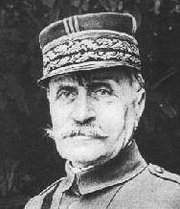Ferdinand Foch
|
|
Ferdinand_Foch_Monument.jpg
Ferdinand Foch (October 2, 1851 – March 20, 1929) was a French soldier. He was a French marshal and rose to be commander of the allied armies during World War I.
Foch was born in Tarbes, France. He enlisted in the French infantry in 1870 and saw combat in the Franco-Prussian War. In 1871 Foch entered the French military academy and received his commission in the artillery in 1873.
He published "Des Principes de la Guerre" ("The Principles of War") in 1903, and "De la Conduite de la Guerre" ("On the Conduct of War") in 1904, and commanded the XXX Corps at Nancy in August 1914.
Foch prevented the advance of the German forces during the great offensive of Spring 1918 at the Second Battle of Marne in July 1918, mounting the counter-attack that was the beginning of the German defeat. In July 1918 Foch was made Marshal of France, and he later accepted the German surrender in November. For his advice during the Polish-Bolshevik War of 1920 as well as pressure on Germany during the Great Poland Uprising he was awarded with the title of Marshal of Poland. He was also made a British Field Marshal in 1919. A statue of Foch was set up at the Compiègne Armistice site when the area was converted into a national memorial (Interestingly, Foch's statue was the one item left undisturbed by the Nazis when they sought to obliterate the area in order to deprive the French of any reminder of the 1918 Armistice).
The FS Foch aircraft carrier was named after him.
Template:Wikiquote Template:Marshals of Poland
| Preceded by: Melchior de Vogüé | Seat 18 Académie française | Succeeded by: Philippe Pétain |
fr:Ferdinand Foch it:Ferdinand Foch hu:Ferdinand Foch no:Ferdinand Foch pl:Ferdynand Foch sl:Ferdinand Foch sv:Ferdinand Foch

